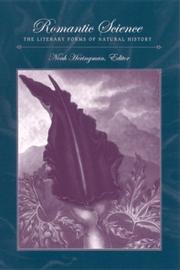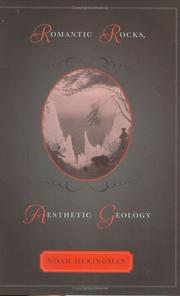| Listing 1 - 7 of 7 |
Sort by
|

ISBN: 0791486931 1417538767 9781417538768 0791457028 9780791457023 079145701X 9780791457016 9780791486931 Year: 2003 Publisher: Albany State University of New York Press
Abstract | Keywords | Export | Availability | Bookmark
 Loading...
Loading...Choose an application
- Reference Manager
- EndNote
- RefWorks (Direct export to RefWorks)
Although "romantic science" may sound like a paradox, much of the romance surrounding modern science—the mad scientist, the intuitive genius, the utopian transformation of nature—originated in the Romantic period. Romantic Science traces the literary and cultural politics surrounding the formation of the modern scientific disciplines emerging from eighteenth-century natural history. Revealing how scientific concerns were literary concerns in the Romantic period, the contributors uncover the vital role that new discoveries in earth, plant, and animal sciences played in the period's literary culture. As Thomas Pennant put it in 1772, "Natural History is, at present, the favourite science over all Europe, and the progress which has been made in it will distinguish and characterise the eighteenth century in the annals of literature." As they examine the social and literary ramifications of a particular branch or object of natural history, the contributors to this volume historicize our present intellectual landscape by reimagining and redrawing the disciplinary boundaries between literature and science.Contributors include Alan Bewell, Rachel Crawford, Noah Heringman, Theresa M. Kelley, Amy Mae King, Lydia H. Liu, Anne K. Mellor, Stuart Peterfreund, and Catherine E. Ross.
Natural history in literature. --- Literature and science --- Nature in literature. --- English literature --- Nature in poetry --- History --- History and criticism. --- 19th century --- History and criticism --- Great Britain --- Natural history in literature
Book
ISBN: 9780691235790 9780691236773 Year: 2023 Publisher: Princeton : Princeton University Press,
Abstract | Keywords | Export | Availability | Bookmark
 Loading...
Loading...Choose an application
- Reference Manager
- EndNote
- RefWorks (Direct export to RefWorks)
"Deep Time: A Literary History challenges the exclusive association between deep time and the modern science of geology by focusing on late Enlightenment writings that used narrative form to integrate new empirical data and methods with Western and non-Western traditions of chronology, earth history, and human origins. Choosing the mid-eighteenth century as a starting point, Heringman aims to demonstrate how deep time became associated with Earth history in the first place, expanding its conceptual domain to include colonial natural history, oral tradition, and scientific romance-all frontiers of the expanded time horizons associated with modernity. It considers the conceptual opening of a modern geological timescale in literary, scientific, and travel writing in the late-Enlightenment/Romantic period, with chapters on the explorer-naturalist team of John Reinhold and George Forster, who sailed with Captain Cook (1772-1775); Buffon's protogeochronological Epochs of Nature (1778); Herder, Blake, and prehistory through oral tradition; and Charles Darwin's dialogue with anthropology and archaeology, especially in The Descent of Man (1871). When eighteenth- and nineteenth-century explorers, naturalists, poets, and philosophers wrote about the "abyss of time," they referred to a large and diverse set of new ideas that unsettled the established time scale: ideas about cultural evolution inspired by Pacific peoples recently encountered by James Cook and other voyagers; a new sense of the depth and diversity of the Earth's strata, produced by increased attention to their structure and deposition; the study of oral traditions by poets and scholars associated with the ballad revival; and the study of non-Western scriptures such as the Mahabharata, which calculated time on an entirely different scale. The latter two pursuits dovetailed with the investigations of voyagers from Johann Reinhold Forster to Charles Darwin, who sought to measure the age of non-European civilizations by way of the geological age of their environments. Ultimately, Heringman argues that the concept of deep time, now associated primarily with modern geology, "was a composite of human and natural history to begin with.""--
Geological time and literature. --- Human ecology and literature. --- Geology in literature. --- English literature --- Literature and science --- Technical writing --- History and criticism. --- History --- Buffon, Georges Louis Leclerc, --- Forster, Georg,

ISBN: 0801441277 0801457513 0801458757 0801476267 Year: 2004 Publisher: Cornell University Press
Abstract | Keywords | Export | Availability | Bookmark
 Loading...
Loading...Choose an application
- Reference Manager
- EndNote
- RefWorks (Direct export to RefWorks)
Book
ISBN: 9780199556915 0199556911 0191744999 0191626066 1299409296 9780191626067 9780191744990 Year: 2013 Volume: *29 Publisher: London Oxford University Press
Abstract | Keywords | Export | Availability | Bookmark
 Loading...
Loading...Choose an application
- Reference Manager
- EndNote
- RefWorks (Direct export to RefWorks)
Heringman focuses on the illustrators, fieldworkers, and ghostwriters associated with the production of scholarly plate books during the Romantic-era. The volume explores how the expertise acquired by these intellectuals precipitated a major shift in research and forged a broader perception of antiquity transforming intellectual life.
Book history --- Pure sciences. Natural sciences (general) --- anno 1700-1799 --- Great Britain --- Scientific illustration --- Illustrated books --- Natural history --- Historiography --- History --- Intellectual life --- English literature --- Natural history in literature. --- Roman influences. --- History and criticism.
Digital

ISBN: 9781487518486 9781487503673 Year: 2019 Publisher: Toronto, Ont. University of Toronto Press
Abstract | Keywords | Export | Availability | Bookmark
 Loading...
Loading...Choose an application
- Reference Manager
- EndNote
- RefWorks (Direct export to RefWorks)
Book

ISBN: 9780271080390 Year: 2017 Publisher: University Park, PA
Abstract | Keywords | Export | Availability | Bookmark
 Loading...
Loading...Choose an application
- Reference Manager
- EndNote
- RefWorks (Direct export to RefWorks)
Digital

ISBN: 9780271080390 Year: 2017 Publisher: University Park, Pa Penn State University Press
Abstract | Keywords | Export | Availability | Bookmark
 Loading...
Loading...Choose an application
- Reference Manager
- EndNote
- RefWorks (Direct export to RefWorks)
| Listing 1 - 7 of 7 |
Sort by
|

 Search
Search Feedback
Feedback About UniCat
About UniCat  Help
Help News
News